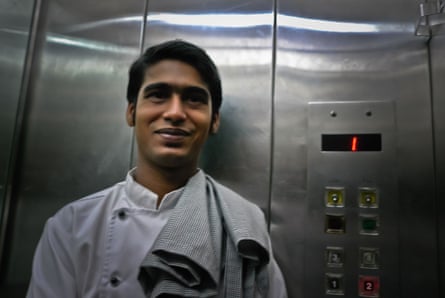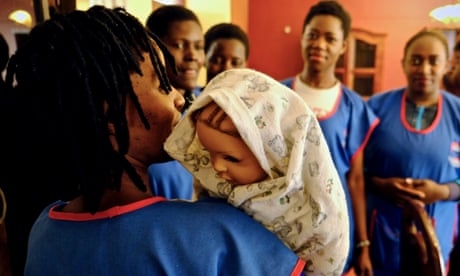'People will forgive you for being wrong, but they will never forgive you for being right - especially if events prove you right while proving them wrong.' Thomas Sowell
Search This Blog
Wednesday, 17 July 2024
Tuesday, 9 July 2024
The Hindujas made UK headlines for mistreating their servants. In India no one batted an eye – here’s why
Although some domestic staff in the subcontinent are treated well, for most it is a relentlessly harsh and thankless existence writes Amrit Dhillon in The Guardian
How the Hindujas, Britain’s richest family, treated their domestic staff at their Swiss mansion made it to the courts and on to the front pages last month. But in India it failed to elicit even a flicker of attention.
Plenty of Indians treat their cooks, maids, drivers and nannies very well. They offer a decent wage, time off, speak to them politely, and appreciate their hard work. They educate the staff’s children in good schools and help to pay for family weddings. When staff grow too old to work, they are bid adieu with a lump sum and a monthly pension for the remainder of their lives as a token of gratitude. During sickness, they are taken to good doctors for treatment without having to pay.
Some Indians are very generous. When one employer heard that a young woman who had worked for her briefly had been diagnosed with HIV – which she had passed on to her son in pregnancy – the ex-employer began paying a generous sum into her bank account every month to help the young mother manage.
The norm across India, though, is less benign. For most of the maids, cooks, drivers and ayahs (nannies) who work in homes, the following rules apply:
Your work is never done
All the chores may have been finished but no break or relaxation is allowed. It affronts the master’s sense of decency. More work is created. “Come and massage my legs.” “Polish the brass ornaments.” “Oil granny’s hair.” In Aravind Adiga’s novel The White Tiger, when the couple’s cook is not available, they order the driver to cook for them. If a family has no plans to go out, the driver is kept on call, even though he is baking in the heat and could easily be sent home.
Drivers get every Sunday off but maids are lucky to get two Sundays off in a month and certainly no birthdays. This has prompted some maids to claim they are Hindus married to a Christian man because they are then entitled to more public holidays and festivals.
No space is your own
The maid sleeps on the landing or passage or any available corner. If there are “servant’s quarters” in the home, they are kennels on the rooftop. It is imperative that the rooms have a low roof and no window. When builders erect opulent apartments fitted with Italian marble and Belgian chandeliers, they designate a cell for the help, which can contain an inside latrine – yes, inside – so the maid has to use the toilet in the same tiny space. She must speak to her employer standing up, never sitting on a chair, and eat her food sitting on the floor or mat. Even if the family is out, the sofas and chairs are out of bounds.
Use your own plates
The kitchen is a segregated zone. When the maid eats or has a drink of water, it’s off a separate plate and in a separate glass from those used by the family. She is “clean” enough to cook the family’s meal but not clean enough to use the same crockery, even if it’s only cheap melamine.
Do not fall sick
When a maid becomes ill, the family balk at paying for treatment. You’ve got tuberculosis? Tough luck. We’re not paying for tests or medicines for the stipulated six months. She is sent packing on the first available train back to her village.
No one wants a maid who is incapable of working and incurs expenses. This is the same maid or ayah who will have spent years getting up at night to nurse and comfort the family’s sick children.
The fridge is policed
She may spend all day cooking lovely meals but any expensive treats in the fridge are out of bounds. India is the only country in the world where fridge manufacturers add a lock; even the multinationals have succumbed to this demand. When the family leaves the house, the fridge is locked. In many cases, the mistress of the house actually doles out the food on to the maid’s plate to ensure there is no gluttony. Almonds and other nuts are locked away in a cupboard.
Avoid going out for a meal
Once in a while, a grotesque scene plays out in a restaurant or five-star hotel. The family is dining out and has brought the ayah with them to tend to the toddler so that they can enjoy their evening. The family will not tolerate her sitting with them. She is forced to stand by the table, looking miserable and self-conscious in an environment where she feels hideously out of place. Not only is she the only one standing in the restaurant, she is the only one not eating. The family eat and drink, pay the bill and leave without ordering anything for her.
Use the right lifts
In many housing complexes, the part-time (as opposed to live-in) maid has to use a separate lift, presumably because the residents may be offended by the smells wafting from her in the confined space.
Yet it occurs to no one that perhaps the housing conditions of those who work for the residents should be clean and hygienic instead of the fetid shanties near the complex where they are forced to live, sharing a toilet with 50 or more other families and with no running water.
Do not expect anything
People living in gated communities will never provide a shelter or install a fan for the press-wallah who irons their clothes outside in the scorching heat, or give him a plastic chair where he can sit to rest in between bouts of work. When this was rashly raised by some do-gooding, bleeding-heart wuss in one south Delhi neighbourhood, the residents’ welfare association erupted in outrage. They argued that all the drivers and security guards in the area would congregate at the chair, and the spot would become a “den of iniquity”, with people playing cards and gambling, while chatting with the press-wallah. Some associations ban drivers from parks and sitting on the benches. Memsahib thinks their presence lowers the tone.
Saturday, 22 June 2024
'Who says a dog cannot receive better treatment than a servant?': Hinduja family members sentenced to jail for exploiting domestic staff
Sam Jones in The FT
Four members of the multi-billionaire Hinduja clan, the UK’s wealthiest family, have been convicted of exploiting their domestic staff and sentenced to lengthy jail terms by a court in Geneva.
In a ruling on Friday, a panel of three judges found Prakash Hinduja, his wife Kamal, as well as their son Ajay and his wife, Namrata, guilty of serious employment offences related to Indian staff.
“They spent more on [their] dog than one of their servants,” Genevan public prosecutor Yves Bertossa told the court this week in a case that shed a harsh light on the punishing conditions to which one of the world’s wealthiest families subjected their workers.
The court cleared the four Hindujas of the more serious charge of human trafficking that had been brought by the authorities.
The domestic staff at the centre of the case, who were mostly illiterate, had been flown in directly from India to work at the family’s palatial home in Switzerland.
In a damning verdict, presiding judge Sabina Mascotto said the Hindujas had no excuses for their behaviour.
“[The workers] were exploited given their situation in India was so precarious and they were exploited as they didn’t know the language, had their passports confiscated and were only ever paid every 3-6 months,” said Mascotto.
“The four Hindujas knew the vulnerabilities of the staff and knew what the rules were in Switzerland, as they all were Swiss citizens and Ajay was educated in Switzerland,” she added.
The court nevertheless ruled that the employees had known the terms they were signing up for when they entered the family’s service in India and therefore could not have been said to be trafficked.
Reflecting the seriousness of the offences the four were convicted of, Prakash and Kamal were sentenced to four-and-a-half years in prison. Ajay and Namrata received a four-year sentence.
An appeal process could take years in Switzerland’s often slow-moving justice system, under which a judgment is not considered final until all avenues of appeal have been exhausted. The four Hinduja family members were not present at the court for the verdict.
Romain Jordan, a lawyer for the family, said his clients were “appalled and disappointed” by the court’s decision.
“Importantly, the family has been acquitted of human trafficking charges,” he said.
An appeal has already been filed. “Under Swiss law, the presumption of innocence is paramount until an adverse final judgment by the highest adjudicating authority is enforced,” Jordan emphasised.
Prakash is the second of three brothers behind the Hinduja Group, a sprawling multinational conglomerate with interests in everything from cars and petrochemicals to banking and armaments.
His older brothers Gopichand and Srichand settled in London in the 1980s and made it the centre of the group’s affairs. Gopichand, worth an estimated £35bn, is the UK’s richest man. Srichand died last May.
Prakash settled in Switzerland, from where he runs the family business. He was made a Swiss citizen in 2000. His younger brother, Ashok, runs the Hinduja Group’s Indian interests.
In a week of explosive revelations, Geneva’s public prosecutor accused Prakash, Kamal, Ajay and Namrata of treating their employees as indentured servants.
They were accused of keeping the staff trapped at a villa in the ultra-exclusive Geneva lakeside suburb of Cologny, where they slept in substandard conditions in basement rooms.
The workers were paid less than one-tenth of the salary they were entitled to under Swiss law, according to the prosecutor Bertossa.
One servant was paid just 7 Swiss francs a day, and worked as many as 18 hours, 7 days a week, Bertossa alleged. The family dog had more than three times as much spent on it, according to documents seized by police and presented to the court.
As well as attending to the family at Cologny, the retinue of staff travelled with the Hindujas to their ski chalet in the Swiss alps and villa on the Cote d’Azur, but otherwise had almost no personal freedom, Bertossa said.
Their passports were taken from them. They were paid in rupees into Indian bank accounts, which they did not have access to while in Switzerland, he said.
Giving testimony, members of the family denied the allegations against them, and said their staff had been like “members of the family.”
Ajay’s lawyer, Yael Hayat, told the court that the prosecutor’s claims about employees were exaggerated. “When they sit down to watch a movie with the kids, can that be considered work?” she asked the court to consider.
A civil case brought against the family on behalf of their staff was settled for an undisclosed sum last week.




